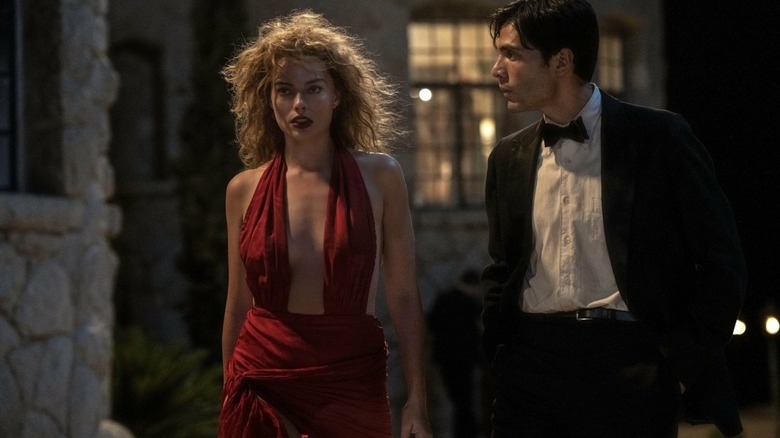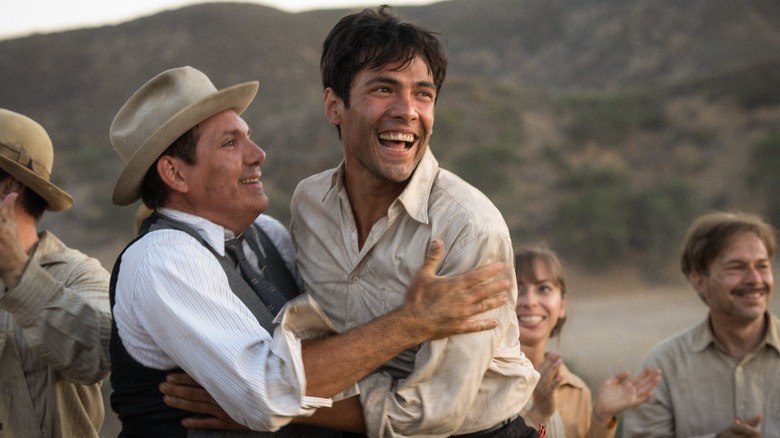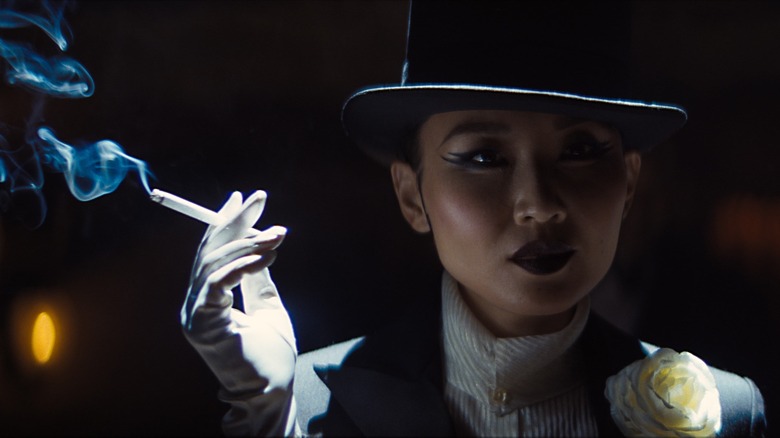Damien Chazelle Considers Babylon A 'Darker Companion Piece' To Singin' In The Rain [Exclusive]
Damien Chazelle's new film "Babylon," a 189-minute drunken love letter to 1920s Hollywood, bears very little resemblance to actual Hollywood history. It follows a pair of fictional would-be silent movie stars named Manuel Torres (Diego Calva) and Nellie LeRoy (Margot Robbie) as they traverse the gloriously depraved, days-long, drug-and-urine-soaked house parties where all the industry higher-ups hang out. Crossing their paths on the way down is Jack Conrad (Brad Pitt), a once-big star who is most assuredly aging out of his hedonism phase. The entire town is thrown into upheaval by the introduction of synchronized sound, a technological advance that causes the unending party to finally end. The stars have to work overtime to adapt, not always taking the change well. Indeed, it ruins many lives, and even the parties eventually have to move into Hell-like pits of despair.
This, minus the hedonism, is the same story as Stanley Donen's and Gene Kelly's 1952 musical "Singin' in the Rain." In that film, set in the same years as "Babylon," Kelly plays a silent movie stuntman and dancer who, thanks to his open mind and adaptability, finds that he can easily transition from silent movies into musicals. It's the studio's star, Lena Lamont (Jean Hagen) who struggles, largely because of her high-pitched voice and unusual Brooklyn accent. She'll eventually have to be dubbed by the pure-hearted but overlooked teen ingenue Kathy (Debbie Reynolds). It's slick and clean and just as fantastical as "Babylon."
At the end of Chazelle's film, Manuel goes to see "Singin' in the Rain" in the theater, just in case the parallels weren't clear.
In a recent interview with /Film's own Ben Pearson, Chazelle admitted that "Babylon" was meant to be paired with Donen's and Kelly's film, offering a dirtier, modern take on the same period in history.
The first time I thought about silent movies
Chazelle admits that "Singin' in the Rain" is one of his favorite movies, and that he hadn't considered the painful silent-to-sound transition that 1920s Hollywood was forced to make until he saw it. When he started doing his own research into the era, however, he found a litany of death and misery. Through his own studies, Chazelle discovered that many, many careers were ruined by the introduction of sound and that some people in Hollywood even ended their own lives over the tumult. In his words, real-life saw "an entire way of life and way of making movies really being obliterated."
Chazelle then blended the real-life opulence and misery of '20s Los Angeles with the fantasy of "Singin' in the Rain," creating the excitable animal that is "Babylon." In his words:
"[I]t felt like there could be space for this almost darker companion piece. Someone joked the other day to me — I want to steal it now — [that "Babylon" is] the evil cousin or evil twin to what had been depicted before. I think that got me going and got me looking at the period in a different way, and then really looking at what came before sound and looking at the insanity of the period that preceded it and realizing, in some ways, that the reason that sound was such a cataclysmic event for this society was that it was such a seat-of-your-pants, circus-like society [...]."
The film industry was already nearly 20 years old at that point, and the glorious world of pre-Depression America did indeed allow for "the wild wealthy" to emerge. These days, one can find any number of historical exposés about the mad sex parties of the jazz age.
Uniquely ill-equipped
Chazelle depicts the era's film industry as being "uniquely ill-equipped" to handle such a dramatic technological change. Not from a business perspective, or even a technical one, but because of Hollywood's own — to his eye — immaturity. In "Babylon," almost every single person in the film industry longs to attend the elephant-and-urine-forward parties seen at the movie's start. The goal, he argues, was not necessarily to make art or tell stories or make a decent living. For Chazelle, the end goal of a film career was to get wasted and have sex in public places with no repercussions. Without regulations and social mores in place, Chazelle feels that the whole town became rickety. In his words:
"It was more fragile than I think people on the ground really realized because it was so unregulated, it was so free-for-all, everyone was living such insane lives. You party like that, you think it can go on forever, and then suddenly real life comes knocking on the door and you are screwed, because you're just not equipped to handle it. That's my metaphor in my mind for Hollywood at that time. It was uniquely ill-equipped to handle a sea change like what happened. But you can't tell that story, I think, without acknowledging 'Singin' in the Rain' in some way."
Actual reality, of course, rests somewhere between the clean smiles of "Singin' in the Rain," and the vomitous raucousness of "Babylon." When taken as a double feature, one might find themselves envisioning the properly balanced, historical transition-to-sound in their mind. It will certainly inspire one to go to their library to learn more.


